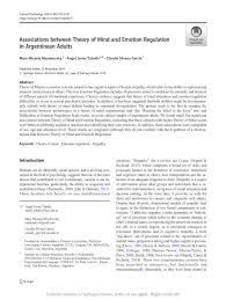Por favor, use este identificador para citar o enlazar este ítem:
https://repositorio.uca.edu.ar/handle/123456789/14689| Campo DC | Valor | Lengua/Idioma |
|---|---|---|
| dc.contributor.author | Meyebovsky, Mara Micaela | es |
| dc.contributor.author | Tabullo, Ángel Javier | es |
| dc.contributor.author | García, Claudia Silvana | es |
| dc.date.accessioned | 2022-08-19T11:28:27Z | - |
| dc.date.available | 2022-08-19T11:28:27Z | - |
| dc.date.issued | 2019 | - |
| dc.identifier.citation | Meyebovsky, M.M., Tabullo, A.J., García, C.S. Associations between theory of mind and emotion regulation in Argentinean adults [en línea]. Current Psychology. 2021, 40 doi:10.1007/s12144-019-00539-9 Disponible en: https://repositorio.uca.edu.ar/handle/123456789/14689 | es |
| dc.identifier.issn | 1046-1310 | - |
| dc.identifier.issn | 1936-4733 (online) | - |
| dc.identifier.uri | https://repositorio.uca.edu.ar/handle/123456789/14689 | - |
| dc.description.abstract | Abstract: Theory of Mind is a construct closely related to the cognitive aspect of human empathy, which refers to the ability to represent and interpretmental states in others. The termEmotion Regulation includes all processes aimed tomodulate the intensity and duration of different aspects of emotional experience. Clinical evidence suggests that theory of mind alterations and emotion regulation difficulties co-occur in several psychiatric disorders. In addition, it has been suggested that both abilities might be developmentally related, with theory of mind deficits leading to emotional dysregulation. The present study is the first to examine the associations between performance in a theory of mind experimental task (the “Reading the Mind in the Eyes” test) and Difficulties in Emotion Regulation Scale scores, in a non-clinical sample of argentinean adults. We found small, but significant associations between Theory ofMind and Emotion Regulation, indicating that those subjects with higher Theory ofMind scores were better at inhibiting impulsive reactions and identifying their own emotions. In addition, these associations were indepedent of sex, age and education level. These results are congruent (although they do not confirm) with the hypothesis of a developmental link between Theory of Mind and Emotion Regulation. | es |
| dc.format | application/pdf | es |
| dc.language.iso | eng | es |
| dc.publisher | Springer Nature | es |
| dc.rights | info:eu-repo/semantics/closedAccess | * |
| dc.rights.uri | http://creativecommons.org/licenses/by-nc-sa/4.0/ | * |
| dc.source | Current Psychology. 2021, 40 | es |
| dc.subject | TEORIA DE LA MENTE | es |
| dc.subject | EMOCIONES | es |
| dc.subject | EMPATIA | es |
| dc.subject | ADULTOS | es |
| dc.title | Associations between theory of mind and emotion regulation in Argentinean adults | es |
| dc.type | Artículo | es |
| dc.identifier.doi | 10.1007/s12144-019-00539-9 | - |
| uca.disciplina | PSICOLOGIA | es |
| uca.issnrd | 1 | es |
| uca.affiliation | Fil: Meyebovsky, Mara Micaela. Pontificia Universidad Católica Argentina. Facultad de Humanidades y Ciencias Económicas; Argentina | es |
| uca.affiliation | Fil: Tabullo, Ángel Javier. Pontificia Universidad Católica Argentina. Facultad de Humanidades y Ciencias Económicas; Argentina | es |
| uca.affiliation | Fil: Tabullo, Ángel Javier. Consejo Nacional de Investigaciones Científicas y Técnicas. Instituto de Ciencias Humanas, Sociales y Ambientales; Argentina | es |
| uca.affiliation | Fil: García, Claudia Silvana. Pontificia Universidad Católica Argentina. Facultad de Humanidades y Ciencias Económicas; Argentina | es |
| uca.version | publishedVersion | es |
| item.fulltext | With Fulltext | - |
| item.languageiso639-1 | en | - |
| item.grantfulltext | mixedopen | - |
| crisitem.author.dept | Facultad de Humanidades y Ciencias Económicas (Mendoza) | - |
| crisitem.author.orcid | 0000-0002-1340-0156 | - |
| Aparece en las colecciones: | Artículos | |
Ficheros en este ítem:
| Fichero | Descripción | Tamaño | Formato | Login |
|---|---|---|---|---|
| associations-between-theory.pdf | 490,94 kB | Adobe PDF | SOLICITAR ACCESO | |
| thumb.jpg | 8,04 kB | JPEG |  Visualizar/Abrir |
Visualizaciones de página(s)
96
comprobado en 27-abr-2024
Descarga(s)
28
comprobado en 27-abr-2024
Google ScholarTM
Ver en Google Scholar
Altmetric
Altmetric
Este ítem está sujeto a una Licencia Creative Commons

